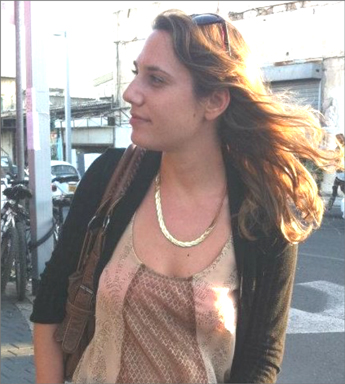
Klil Agassi first became aware of the social distance between Arabs and Jews, while she was working toward her degree in Humanities and Theatre at University of Tel Aviv. “We ate in the same cafeterias, sat in the same classrooms, but there was no contact between us,” she said.
Looking for a way to engage in significant interaction with Arabs, Klil joined, and then interned with, NIF grantee Sadaka Reut Jewish Youth Partnership Group where she started a student group and became a facilitator.
Looking to intensify her involvement with social change work, Klil applied to Shatil’s year-long Everett Fellows for Social Justice program. This month, she is one of 42 students to complete their internships with the program.
Over the past year Klil has interned at flagship NIF grantee the Association for Civil Rights in Israel (ACRI). There, together with ACRI attorney and NIF Law Fellow alumnus Gil Gan-Mor, she worked to expose the unsavory discriminative practices of sales agents representing new housing projects in the mixed Arab and Jewish cities of Lod and Jaffa.
“Gil Gan-Mor and I built the project from the ground up. We enlisted volunteers and developed a training session for them with a simulation of the investigative work we wanted to them to do: to act as prospective buyers by initiating contact with the housing sales agents and engaging them in their sales pitch. In fact, the sales agents gave distinctly different information on prices and availability of housing units to the Arab and the Jewish volunteers acting as buyers. The agents were smooth, friendly and cordially unwelcoming to prospective Arab buyers.”
“On the one hand,” says Klil, “it’s infuriating and sad to see how rampant this discrimination is. On the other hand, it’s inspiring to see how much power ACRI has in enabling a process that can bring about litigation and policy change, and that one of the agents we exposed has already been fired.”
Klil bubbles with enthusiasm when she recalls her experience as an Everett fellow: “The program was excellent; each of the content meetings was meaningful and changed my awareness in some way. I learned how accessible the Knesset is to an average person and how many civil rights we actually have; and it was extremely important to sit face-to-face with our host from Umm al-Hiran, and hear first-hand about the challenges of living in an unrecognized Bedouin village.”
As an outgrowth of this experience, Klil is currently studying towards a graduate degree in Mediation and Conflict Resolution at University of Tel Aviv. The Everett program has taken her one more step along the path of creating social change for a better Israel.
The Everett Program for Social Justice has provided internships, experiential programming to deepen participants’ understanding of issues critical to Israeli society, and tools to create social change for 14 years — thanks to the generosity of its founders Edith and the late Henry Everett.
